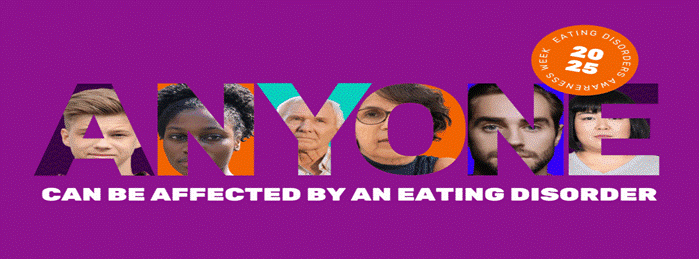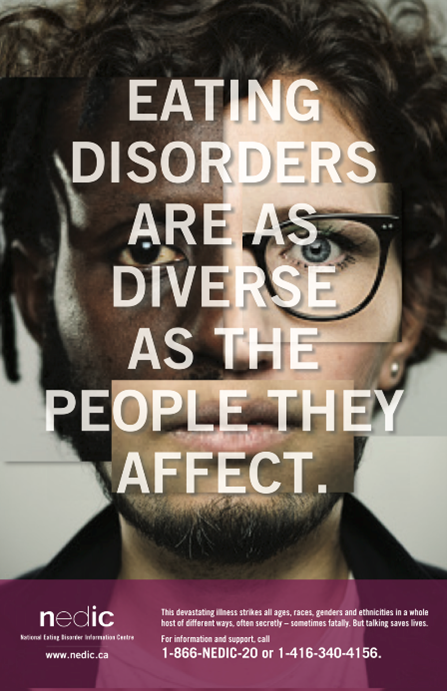

Having an eating disorder or disordered eating behaviour is NOT your fault - they are complex and driven by many factors. Treatment requires the expertise of both the diabetes team and additional team members skiled in managing eating disorders. If you have concerns, please discuss them with a member of your healthcare team.
Eating Disorders Awareness Week (EDAW) is an annual effort by groups across Canada, the U.S., Europe, and Australasia to increase awareness and educate the public on the relationship between dieting, body dissatisfaction and eating disorders.
Eating disorders are serious but treatable mental illnesses that can affect anyone regardless of gender, age, racial and ethnic identity, sexual orientation, or socio-economic background.These disorders are serious, biologically influenced illnesses, and not personal choices. Recovery is possible.
In Canada, an estimated 2.7 million people are impacted by eating disorders; Approximately 1.4 million of these are youth. Younger Canadians are also increasingly engaging in dieting behaviour which may put them at risk of developing an eating disorder and other health-compromising conditions. In Canada, between 12% and 30% of girls and 9% and 25% of boys aged 10-14 report dieting to lose weight.
Eating disorders include Anorexia Nervosa (AN), Bulimia Nervosa (BN), Binge Eating Disorder (BED), Avoidance Restrictive Food Intake Disorder (ARFID) and Otherwise Specified Feeding and Eating Disorder (OSFED). You can follow this link for the definitions and more information: https://nedic.ca/eating-disorders-treatment/
Too many people with an eating disorder are never diagnosed but suffer significant personal and family distress. Only 10% of people receive appropriate treatment, and an even smaller proportion are not able to access early intervention services.
Diabetes and food are closely linked. Living with diabetes can mean we are focusing more on diet, weight, and body image, so it’s not surprising that some people can start to feel negatively about food. Some people living with diabetes can develop an unhealthy relationship or fixation on food. This can lead to something called disordered eating behaviour or possibly an eating disorder. Disordered eating isn’t the same as having a diagnosed eating disorder, but the signs and behaviours are similar, like skipping insulin for weight loss, or binge eating and making yourself sick. One can lead to the other, so it’s important you get help before things get worse.
Women with Type 1 diabetes have twice the risk of being affected by an eating disorder than women without diabetes. Both male and female identifying teens with Type 1 diabetes have a higher incidence of eating disorders than their peers without diabetes.
Research suggests up to 25% of people living with type 2 diabetes struggle with some form of binge eating behaviours and that 1 in 3 people who struggle with binge eating disorder will develop type 2 diabetes in their lifetime.
The following are some of the signs of disordered eating:
Diabulimia - is an eating disorder where one purposefully manipulates or withholds insulin to lose weight.
T1DE - is nomenclature that was crated in the U.K. It stands for Type 1-Disordered Eating.
ED-DMT1 - stands for Eating Disorder-Diabetes Mellitus Type 1; it refers to a person with Type 1 Diabetes that also suffers from any eating disorder.
CMHA-WWD is a community-based team that includes social workers, dietitians, nurse practitioners, therapists, and a consulting psychiatrist. They help individuals and families dealing with eating disorders such as anorexia nervosa, bulimia nervosa and binge eating disorder. They provide treatment for children, youth and adults in Waterloo Region and Wellington County.
To contact them or to make a referral:
Call HERE24SEVEN at 1-844-437-3247
Service Locations:
Fergus: 234 St. Patrick Street East
Mount Forest: 492 Main Street North
Kitchener: 67 King Street East
Guelph: 80 Waterloo Avenue (main office) or 485 Silvercreek Parkway North -Suite 1
Cambridge: 3-9 Wellington Street - Suite 3
Waterloo: 1 Blue Springs Drive - Suite 100
If you have other questions, the National Eating Disorder Information Centre (NEDIC) Helpline may be able to provide you with answers or direct you appropriately. They can be reached at 1-866-633-4220.
Diabulimia helpline: www.diabulimiahelpline.org
Check out these other links you might find helpful and informative:
|
 |
|---|
Resources: